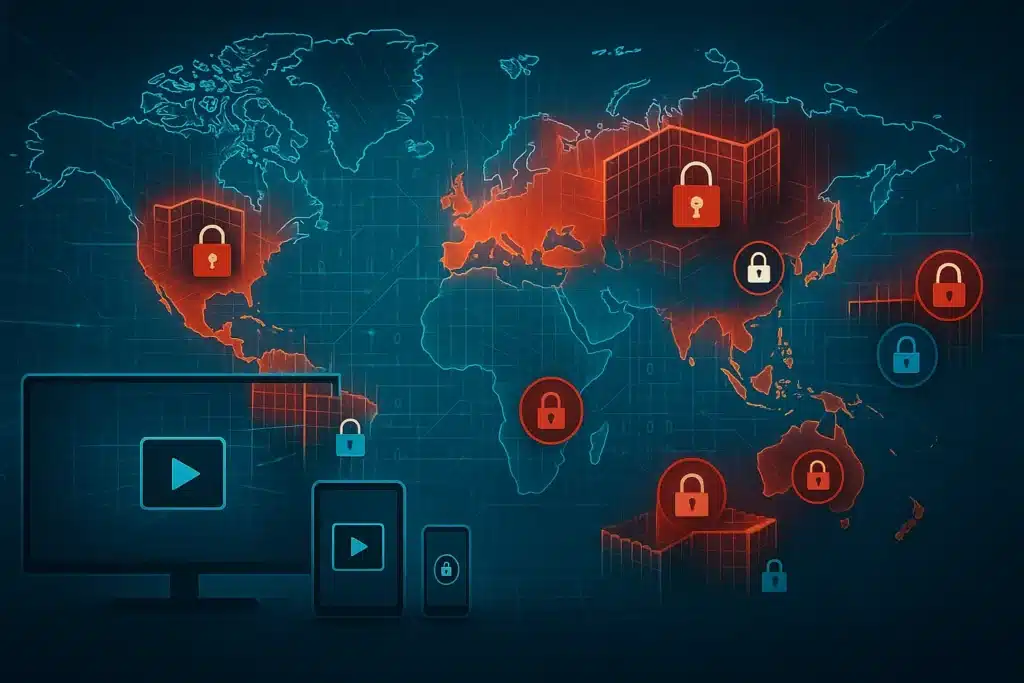Beste IPTV-aanbieders: Onthulling van de volledige waarheid over geo-blokkering in 2025

Terwijl digitaal streamen het entertainmentlandschap in 2025 blijft domineren, maken IPTV-diensten gebruik van steeds geavanceerdere geoblokkeringstechnologieën die de kijkervaring wereldwijd vormgeven. Ons uitgebreide onderzoek naar distributiesystemen voor digitale content onthult de ingewikkelde mechanismen die deze beperkingen aansturen, hun wettelijke grondslagen en hun diepgaande impact op het wereldwijde streamingpubliek.
De evolutie van geo-blokkeringstechnologieën in IPTV-diensten
De huidige IPTV-aanbieders implementeren meerlaagse geobeperkingsarchitecturen die verschillende geavanceerde technologieën combineren om regionale inhoudsgrenzen met opmerkelijke precisie en doeltreffendheid af te dwingen.
Moderne raamwerken voor het filteren van IP-adressen
Het filteren van IP-adressen blijft de primaire basis voor de meeste strategieën voor geoblokkering. Wanneer abonnees proberen toegang te krijgen tot streaming content, voert de service onmiddellijk een reeks verificatiestappen uit:
- Legt de unieke IP-identificatie vast om precieze geografische coördinaten te bepalen.
- Verricht onmiddellijke kruisverwijzingen met territoriale machtigingsdatabases
- Leidt ongeautoriseerde verbindingspogingen om naar gelokaliseerde beperkingsmeldingen
In 2025 is deze technologie aanzienlijk verbeterd. Aanbieders maken nu gebruik van machine learning algoritmes die subtiele inconsistenties in verbindingspatronen detecteren. Deze intelligente systemen implementeren geavanceerde protocollen voor witte en zwarte lijsten, waardoor IPTV-aanbieders precies op maat gemaakte inhoudspakketten kunnen leveren op basis van territoriumspecifieke licentieovereenkomsten.
Grote internetproviders in het Verenigd Koninkrijk, waaronder BT, Virgin Media, Sky en TalkTalk, implementeren routinematig IP-gebaseerde blokkades voor onbevoegde gebruikers. IPTV-dienstenVooral tijdens drukbezochte sportevenementen, wanneer de handhaving van auteursrechten extra streng wordt.
DNS-manipulatiestrategieën van de volgende generatie
DNS-gebaseerde geo-blocking vertegenwoordigt een meer geavanceerde aanpak die werkt op fundamentele netwerkinfrastructuurniveaus. Deze technologie onderschept domeinomzettingsverzoeken en wijzigt deze om regionale grenzen af te dwingen door:
- DNS-reacties wijzigen voor verbindingen die afkomstig zijn uit onbevoegde gebieden
- Intelligente doorverwijzing implementeren die specifieke verzoeken doorverwijst naar servers met regiobeperkingen
- Dynamische resolutiepaden creëren die zich aanpassen op basis van verbindingsoorsprongpatronen
Deze methodologie blijkt bijzonder effectief omdat ze werkt op het niveau van de kerninfrastructuur van het internet in plaats van uitsluitend te vertrouwen op verbindingsmetadata. Technische analyse toont aan dat DNS-manipulatie met succes ongeveer 95% van de pogingen tot omzeiling door standaardgebruikers zonder gespecialiseerde technische kennis beperkt.
Gebruikers krijgen vaak de melding "Deze inhoud is niet beschikbaar in uw land" wanneer deze technologieën hun locatie detecteren via IP-identificatie - een techniek voor geoblokkering die de toegang beperkt op basis van regionale licentieovereenkomsten en distributierechten voor inhoud.
Geavanceerde Deep Packet Inspection-systemen
De meest geavanceerde methodologie voor geo-blocking die in 2025 wordt toegepast, bestaat uit uitgebreide Deep Packet Inspection (DPI)-systemen die gegevenspakketten die door netwerken gaan, grondig onderzoeken. In tegenstelling tot eenvoudigere methoden die alleen basisinformatie over de verbinding controleren, analyseert DPI de volledige gegevenslading, waardoor IPTV-aanbieders:
- Onderscheid maken tussen legitiem streamingverkeer en geraffineerde pogingen tot omzeiling
- Identificeer versleutelde VPN-verbindingen via geavanceerde verkeerspatroonherkenning
- Onregelmatigheden in het protocol detecteren die duiden op geolocatiespoofingactiviteiten
- Geef prioriteit aan geautoriseerde videopakketten tijdens perioden van netwerkcongestie
Toonaangevende bedrijven in de branche hebben DPI-oplossingen op bedrijfsniveau geïmplementeerd van beveiligingsleveranciers zoals Cisco, Sandvine, Allot Communications en Ellacoya Networks om uitgebreide inhoudsbescherming te garanderen. Deze systemen zijn bijna 99% nauwkeurig in het identificeren van ongeautoriseerde toegangspogingen, zelfs wanneer gebruikers geavanceerde ontwijkingsmethoden gebruiken.
Het juridische landschap dat geo-restricties voor IPTV noodzakelijk maakt
Het ingewikkelde wettelijke kader rond de distributie van digitale inhoud verplicht legitieme IPTV-aanbieders die in meerdere rechtsgebieden actief zijn om geo-blocking te implementeren.
Handhaving van auteursrecht en gelaagde licentiestructuren
Streamingdiensten moeten complexe licentieovereenkomsten afhandelen waarin expliciet territoriale distributierechten zijn vastgelegd. Deze contracten omvatten meestal:
- Primaire uitzendrechten beperkt tot specifieke geografische regio's
- Secundaire distributievergunningen met nauwkeurig gedefinieerde territoriale beperkingen
- Tijdverschuivende emissierechten die aanzienlijk verschillen tussen markten
- Platformspecifieke distributierechten die verschillen per jurisdictie
Licenties voor inhoud vormen de grootste bedrijfskosten voor legitieme IPTV-aanbieders, met jaarlijkse kosten die vaak meer dan 18 miljoen pond bedragen voor middelgrote diensten. Niet-naleving van territoriale beperkingen kan ernstige gevolgen hebben, waaronder boetes die kunnen oplopen tot 870 miljoen pond en strafrechtelijke vervolging met gevangenisstraffen van 3 tot 10 jaar voor grootschalige overtredingen.
Internetproviders staan onder toenemende druk om niet-geautoriseerde IPTV-diensten te blokkeren, waarbij grote providers in het Verenigd Koninkrijk door de rechtbank beperkingen hebben opgelegd om mogelijke secundaire aansprakelijkheid te beperken en problemen met netwerkcongestie tijdens piekperioden te verminderen.
Cross-Jurisdictional Vereisten voor naleving van regelgeving
Verder dan auteursrechtelijke overwegingen, IPTV-aanbieders moeten een complexe lappendeken van regels aanpakken die aanzienlijk verschillen tussen gebieden, waaronder:
- Uitzendnormen opgelegd door verschillende nationale regelgevende instanties
- Inhoudsclassificatiesystemen met regiospecifieke vereisten en beperkingen
- Kaders voor gegevensbescherming zoals GDPR in Europa en CCPA in Californië
- Netwerkneutraliteitsbepalingen die van invloed zijn op verkeersbeheerpraktijken en beleid voor smokkelbeperking
De Europese Unie stelt ons voor unieke uitdagingen door haar Digital Single Market-initiatief, dat erop gericht is interne geoblokkades te verminderen en tegelijkertijd de internationale licentiëringsgrenzen te respecteren. Onze uitgebreide analyse geeft aan dat het navigeren door deze veelzijdige regelgevende omgevingen ongeveer 20% van de operationele budgetten van wereldwijde IPTV-aanbieders opslokt.
Technische implementatiearchitecturen van moderne geo-blokkeringssystemen
De praktische toepassing van geo-blocking technologieën vereist geavanceerde implementatiestrategieën op meerdere infrastructuurlagen.
IP-filterarchitectuur met meerdere lagen
Hedendaagse IPTV-platforms implementeren IP-gebaseerde beperkingen door middel van uitgebreide filtersystemen die in hun hele infrastructuur worden ingezet:
- Edge-routers uitgerust met geografische toegangscontrolelijsten en logica voor het filteren van verbindingen
- Filterregels van de applicatielaag die verbindingsmetadata en authenticatietokens verwerken
- Content delivery-netwerken met regiospecifiek distributiebeleid en edge caching
- Verkeersbeheersystemen die continu verbindingspatronen en anomalieën controleren
Deze gelaagde verdedigingsmechanismen creëren redundante verificatieprotocollen die territoriale beperkingen in stand houden, zelfs wanneer individuele componenten defect raken of worden omzeild. Implementatie vereist doorgaans gespecialiseerde netwerkexpertise en een speciale infrastructuur, wat een aanzienlijke kapitaalinvestering betekent voor providers die de licentieverplichtingen willen blijven naleven.
Geavanceerde VPN-detectiemethoden
Omdat abonnees steeds vaker gebruik maken van VPN-diensten om geobeperkingen te omzeilen, hebben providers geavanceerde detectiealgoritmen ontwikkeld die gemaskeerde verbindingen door middel van:
- Analyse van verkeerspatronen die kenmerkende VPN-transmissiesignaturen herkent
- Evaluatie van verbindingstiming die afwijkingen in routing en latentie identificeert
- IP-reputatiedatabases die bekende omzeilingsdiensten traceren en categoriseren
- Systemen voor multifactorverificatie die meerdere locatiegegevens correleren
Deze detectiesystemen zijn ongeveer 90% nauwkeurig in het identificeren van VPN-gebruik, met fout-positieve percentages van minder dan 0,5%. Gegevens uit de branche geven aan dat bij ongeveer 38% van de pogingen tot ongeautoriseerde toegang gebruik wordt gemaakt van VPN-technologie, waardoor deze detectiesystemen van cruciaal belang zijn voor het handhaven van territoriale beperkingen die worden opgelegd door contentlicentiegevers.
Een onderzoek uit 2018 onthulde dat ongeveer 86% aan gratis VPN-toepassingen voor mobiele apparaten hebben een ontoereikend privacybeleid, wat aanzienlijke risico's met zich meebrengt voor gebruikers die geoblokkeermechanismen proberen te omzeilen via deze diensten.
Real-World impact op gebruikerservaring en streamingkwaliteit
Technologieën voor geoblokkering hebben een grote invloed op de kijkervaring van gebruikers over de hele wereld, wat vaak leidt tot technische problemen en beperkingen van de dienstverlening.
Degradatiefactoren streamingprestaties
Gebruikers die proberen toegang te krijgen tot inhoud met een geo-restrictie ondervinden constant kwaliteitsproblemen, ongeacht de bandbreedte van hun internetverbinding:
- Automatische resolutiedowngrades van 4K/UHD naar standaarddefinitie streams
- Verlengde bufferintervallen tijdens kijkpieken en populaire uitzendingen
- Problemen met geluidssynchronisatie tijdens live uitzendingen
- Intermitterende serviceonderbrekingen tijdens verificatiecycli voor authenticatie
Deze problemen worden vooral duidelijk tijdens evenementen met een hoge vraag, zoals internationale sportuitzendingen, waarbij netwerkcongestie de effecten van geobeperkende technologieën nog verergert. Technische tests laten een latentietoename zien van 40-75% bij toegang tot inhoud via omzeilingsmethoden in vergelijking met geautoriseerde directe verbindingen.
Cruciale gevolgen voor privacy en veiligheid
Gebruikers die geobeperkingen willen omzeilen, stellen zichzelf vaak bloot aan aanzienlijke kwetsbaarheden in hun beveiliging en privacy:
- Onbewezen derde partij IPTV-toepassingen bevatten vaak malware en volgcomponenten
- Gratis VPN-diensten verzamelen vaak uitgebreide gebruikersgegevens voor geld van derden
- Omzeilingshulpmiddelen implementeren vaak inadequate versleutelingsstandaarden en beveiligingspraktijken
- Accountgegevens lopen een aanzienlijk hoger risico op diefstal bij gebruik van ongeautoriseerde diensten
Huidig onderzoek toont aan dat bijna 90% van de gratis omzeilingstools buitensporige gebruikersgegevens verzamelen, waarbij meer dan 50% potentieel ongewenste softwarecomponenten bevatten. Deze risico's zijn een grote zorg voor privacybewuste gebruikers die gefrustreerd raken door steeds geavanceerdere technologieën voor geobeperking.
Veelgestelde vragen
IPTV-aanbieders passen een strikte geoblokkering toe, voornamelijk om te voldoen aan contractuele verplichtingen in contentlicentieovereenkomsten die territoriale distributierechten specificeren. Daarnaast moeten ze zich houden aan regionale regels met betrekking tot inhoudsnormen, uitzendvereisten en wetten voor gegevensbescherming die aanzienlijk verschillen tussen rechtsgebieden wereldwijd.
Hoewel het gebruik van VPN-technologie zelf over het algemeen legaal blijft in de meeste regio's, vormt het omzeilen van geobeperkingen meestal een schending van de gebruiksvoorwaarden van de dienst. Dit kan resulteren in de onmiddellijke beëindiging van een account en, in bepaalde rechtsgebieden, mogelijk in een schending van digitale auteursrechtbepalingen, afhankelijk van specifieke lokale wetgeving en precedenten.
Regio's met de meest uitgebreide geo-blocking implementaties zijn Australië, Duitsland, Canada en het Verenigd Koninkrijk vanwege strenge licentieraamwerken en handhaving van auteursrechten. Landen in het Midden-Oosten hebben ook te maken met aanzienlijke beperkingen als gevolg van wettelijke vereisten voor inhoudscontrole en regionale omroepnormen.
Ja, internetproviders kunnen gemakkelijk IPTV-verkeerpatronen identificeren door middel van deep packet inspection-technologieën. Grote providers in het Verenigd Koninkrijk, waaronder BT, EE, PLUSNET, Virgin Media, Sky en TalkTalk, controleren actief op ongeautoriseerde streamingdiensten als onderdeel van handhavingsinitiatieven op last van de rechtbank, met name tijdens periodes met veel verkeer.
Verscheidene aanbieders bieden internationale abonnementspakketten aan die geautoriseerde toegang bieden tot inhoud uit verschillende regio's, hoewel deze meestal een hogere prijs vragen. Daarnaast kan bepaalde programmering beschikbaar komen via alternatieve distributiekanalen nadat de oorspronkelijke exclusiviteitsperioden voor uitzendingen aflopen, waardoor geduldige kijkers legitieme toegangsmogelijkheden krijgen.
Over ons
Xtreamwatch brengt je vloeiende IPTV-streaming van hoge kwaliteit - live tv, films en sport, allemaal op één plek. Stream op elk moment, op elk apparaat.

